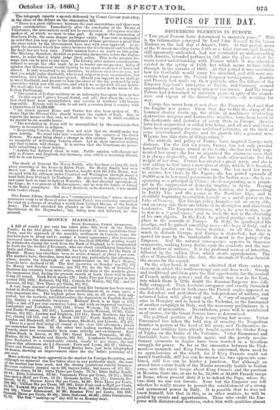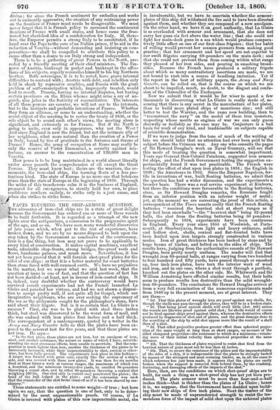TOPICS OF THE DAY.
DISTURBING ELEMENTS IN EUROPE.
" THE great Powers have determined to maintain peace." This is the information conveyed by Lord John Russell to Sir James Hudson on the lag% day of August, 1860. At that period, news of the Warsaw meeting came forth as a faint rumour, and Russia, still apparently undecided, had not concluded an understanding with Austria, intended perhaps to fall into the place of that fa- mous secret understanding with France which it was admitted existed in the spring of 1859, but which seems to have fallen through in the autumn of 1860. At that period it was uncertain how far Garibaldi would carry his standard, and still more un- certain what course the French Emperor would pursue. Austria and Prussia hart made up their quarrels, after the failure of the Emperor Napoleon's enterprise at Baden, and Germany seemed approaching, at least a royal union of her forces. And the Great Powers had determined to maintain peace in spite of the abund- ance and vigour of the disturbing elements—all working for
war.
Europe has never been at rest since the Emperor declared that the Empire was peace. From that day to this the clang of the hammer closing rivets up, the whirr of machinery fabricating destructive weapons and destructive missiles, have been heard in the dockyards and factories of every State in Europe. Armies have been augmented or called into being, and all men and States have been preparing for some undefined calamity, or the birth of some international dispute and its growth into a general war. Whence has this state of things arisen
The attitude and policy of France have inspired Europe with distrust. For the last six years, France has not only paraded herself before Europe armed to the teeth ; she has not only aug- mented her army ; she has so organized the enormous mass that it is always disposable, and she has made other nations feel the weight of her arm. France has created a great navy, and she is now addiug to that navy a new class of ships, which, it is boasted, will give her the supremacy of the seas. She has used her navy to enforce her views in the Tagus ; she has posted upwards of 20,000 men in her small possessions in the Indian seas ; she is co- operating as a principal in China ; she is cooperating as a princi- pal in the suppression of domestic troubles in Syria. Having acquired two provinces on her Alpine frontier, she is proceeding to fortify Nice and the passes of the Maritime Alps, and is stealthily beginning to establish herself as a naval power on the Lake of Geneva. Her foreign policy branches out on every side, and on every side there are tokens of its disruptive and dissolvent tendencies. The Emperor contrives, when he goes to war, to go to war in a "good cause," and to limit the war to the obtaining of his own objects. In the East, he gained prestige and a high place in the councils of Europe. In Italy, he quadrupled his prestige, and he gained something more—the keys of Italy, and a masterful position on the Swiss frontier. In all this, there is much to disturb Europe, and Europe is disturbed ; but she is moved far more by the incalculable element in the policy of the Emperor. And the natural consequence appears in immense armaments, making heavy drains upon the comforts and the ma- terial welfare of nations. It is the profound seeresy of intention, followed by the sudden blow, which create apprehension. The olive of Marseilles hides the first, the arsenals of Toulon furnish the means for the second.
On the other hand, it must be admitted that there exists an element in which this restless energy can and does work. Greedy and traditional ambition gave the first opportunity for the revival of French military power ; and the result was war in the East, into which there is little doubt the Russian Emperor was skil- fully entrapped. Then Austrian arrogance and cruelty furnished another field, so that in both cases the French eagles appeared as the defenders and protectors of the independence of nations, and returned laden with glory and spoil. A "cry of anguish" may arise in Hungary and be heard in the Tuileries, as the forerunner of another campaign in Italy, and the necessary preliminary to a new vote of annexation. Nevertheless, peace will be maintained as of course, for the Great Powers have so determined.
The political position of Italy is anything but secure. Victor
Emmanuel has taken the bold step of crossing the Neapolitan frontier in person at the head of his army, and Piedmontese in- fantry and artillery have already fought against the titular King of Naples on the banks of the Volturno. Victor Emmanuel and Garibaldi have become friends again, and the purely revolu- tionary elements in Naples have been worsted in a bloodless struggle for power. So far as the encounter between the Pied- montese monarch and King Francis is concerned, there need be no apprehension of the result, for if King Francis could not master Garibaldi, still less can he master his two opponents com- bined, still less can he hinder a junction. But although no armed force exists South of the Milieus avowedly hostile to Italian arms, save the royal troops about King Francis and the garrison in Messina, there are, or are to be, 24,000 or 30,000 French troops at Rome, whose present duty it is to defend the Pope, whose fu- ture duty no one can foresee. None but the Emperor can tell whether he really means to permit the establishment of a strong and permanent power in Italy. It is possible that he does not know himself, but that in this, as in other matters, he will be guided by events and opportunities. Those who credit the Em. peror with disinterested motives, endue him with qualities almost
divine ; for since the French sentiment he embodies and works out is eminently aggressive, the creation of any rgtraining power on the frontiers of France must needs be disagreeable. We must never forget that it is French policy to surround the continental frontiers of France with small states, and hence came the frus- trated but cherished idea of a confederation for Italy. If, there- fore, the Emperor permits a strong Italy to be constituted, if he hand over the Pope to the care of an Italian prince, if he aid in the reduction of Venetia—without demanding and insisting on com- pensation—we shall be compelled to attribute this policy to a cause other than a desire to see Italy strong and independent. There is to be a gathering of great Powers in the North, pre- ceded by a friendly meeting of their chief ministers. The Em- peror of Austria, bankrupt in pocket and bankrupt in the affec- tions of his subjects, eagerly reconciles himself to his big Northern brother. Both sovereigns, it is to be noted, have grave internal difficulties to contend with; Austria with debt, and rebellion only held in check by repressive cruelties, and Russia with the giant problem of serf-emancipation which, improperly treated, would lead to revolt. Prussia having no internal 'disputes, but having certain provinces on the Rhine whence might arise a cry of an- guish, also joins in the festivity of reconciliation. The interests of all these powers are counter, we will not say to the interests, but to the instincts and probable intentions of France. Whether they form an alliance, or come to an understanding, whether the secret object of the meeting be to revise the treaty of 1856, or the sole object be to sound each other's views, the meeting alone is significant, and extremely so for France. But if the North is going to unite, even only in appearance, why not the West ? And since England is now the friend, but not the intimate ally of her neighbour, what more natural than the creation of a Power in Italy, bound by ties of gratitude to the fortunes and throne, of France ? Hence, the army of occupation at Rome may really be only the reserve of Victor Emmanuel, a security against mis- fortune, an answer to the concentration of 120,000 men in Venetia.
How peace is to be long maintained in a world almost literally under arms passeth the comprehension of all except the Great Powers. They must know best ; theirs are the warriors, the ar- maments, the iron-clad ships, the teeming fleets of a less pre- tentious kind. The state of Europe is no more one that betokens peace than the state of Europe at the beginning of 1859. Through the midst of this treacherous calm it is the business of England, prepared for all emergencies, to stoutly hold her own, to place confidence nowhere unduly, to strike only in a just cause, and hen she strikes to strike home.



























 Previous page
Previous page